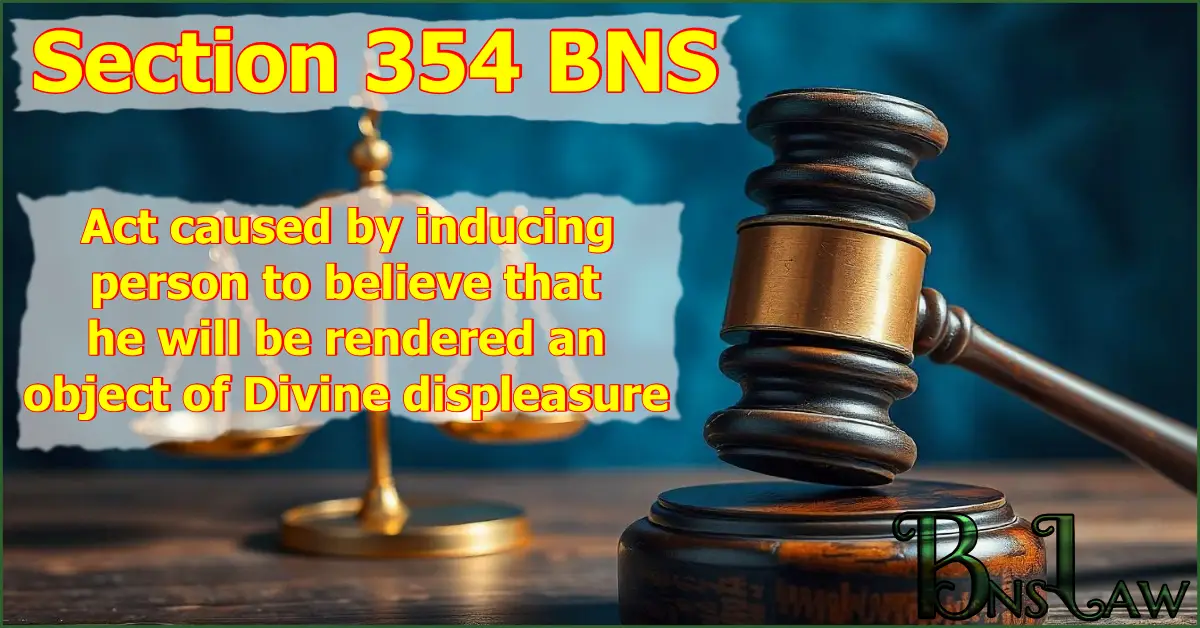Section 354 BNS | BNS 354
Whoever voluntarily causes or attempts to cause any person to do anything which that person is not legally bound to do, or to omit to do anything which he is legally entitled to do, by inducing or attempting to induce that person to believe that he or any person in whom he is interested will become or will be rendered by some act of the offender an object of Divine displeasure if he does not do the thing which it is the object of the offender to cause him to do, or if he does the thing which it is the object of the offender to cause him to omit,
shall be punished with imprisonment of either description for a term which may extend to one year, or with fine, or with both.
Illustrations
(a) A sits dharna at Z’s door with the intention of causing it to be believed that, by so sitting, he renders Z an object of Divine displeasure. A has committed the offence defined in this section.
(b) A threatens Z that, unless Z performs a certain act, A will kill one of A’s own children, under such circumstances that the killing would be believed to render Z an object of Divine displeasure. A has committed the offence defined in this section.
READ OTHER SECTIONS OF CHAPTER XIX — OF CRIMINAL INTIMIDATION, INSULT, ANNOYANCE, DEFAMATION, ETC.
| Section No. | Section Title |
|---|---|
| 351 | Criminal intimidation. |
| 352 | Intentional insult with intent to provoke breach of peace. |
| 353 | Statements conducing to public mischief. |
| 354 | Act caused by inducing person to believe that he will be rendered an object of Divine displeasure. |
| 355 | Misconduct in public by a drunken person. |
| Of Defamation | |
| 356 | Defamation. |
| Of Breach Of Contract To Attend On And Supply Wants Of Helpless Person | |
| 357 | Breach of contract to attend on and supply wants of helpless person. |
FAQs of BNS Section 354
-
354 BNS punishment and fine
Punishment and fine under Section 354 of the BNS: Imprisonment for 1 year, or fine, or both.
-
354 BNS cognizable or not
The offence under Section 354 of the BNS is non-cognizable.
-
354 BNS bailable or not
The offence under Section 354 of the BNS is bailable.
-
354 BNS trial court
Offence specified in Section 354 of the BNS is triable by any Magistrate.
Important Points
- Cognizable Offences: These are offences where a police officer can arrest a person without a warrant.
- Non-Cognizable Offences: These are offences where a police officer cannot arrest a person without a warrant.
- Bailable Offences: These are offences where the accused can get bail from the police station itself. All bailable offences are listed in the First Schedule of the Bharatiya Nagarik Suraksha Sanhita (BNSS).
- Non-Bailable Offences: Offences in which bail is not granted directly from the police station but after hearing the case in the court, the judge decides when bail will be granted. All non-bailable offences are listed in the first schedule of the Bharatiya Nagarik Suraksha Sanhita (BNSS).
- In the above FAQ, “trial court” means the court that has jurisdiction to try the offence.
- In the above FAQ, the expression “Magistrate of the first class” and “Any Magistrate” does not include Executive Magistrates.
Read other Sections of the BNS
Reference Link: New Criminal Laws (BNS), Ministry of Home Affairs







